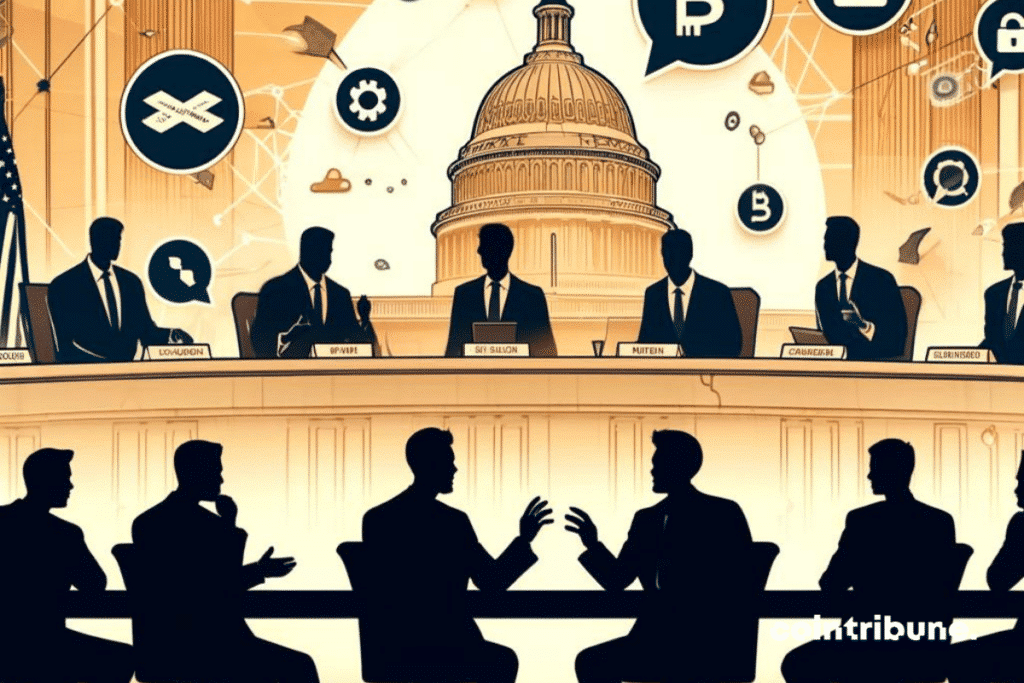Crypto : Decentralized Finance (DeFi) may face strict regulations
Decentralized Finance (DeFi) is increasingly becoming an unavoidable revolution. This week, the US Congress held its very first hearing dedicated to DeFi, a historic milestone for a sector already worth 67 billion dollars. The debate mirrored the deep divisions within the American legislative apparatus, with Republicans praising the innovation and economic freedoms offered by DeFi, while Democrats warned about increased fraud risks and lack of regulation.

The legislative framework under strain
During this initial hearing, Congress members debated how to handle the rapid growth of DeFi. Multiple voices were heard. On one side, Republican Warren DAVIDSON from Ohio asserted that “DeFi is essential for a dynamic financial sector in the United States.” He emphasized that this technology could bring multiple efficiency gains by eliminating traditional intermediaries. “Decentralized Finance represents an opportunity to modernize the American financial system and preserve economic freedom,” he stated.
On the other side, Democrats like Brad SHERMAN from California were much more skeptical. They emphasize the risks of an unregulated finance sector. For SHERMAN, “the complexity of DeFi surpasses that of traditional financial markets, making it fertile ground for fraud.”
What choice to make between innovation or strict regulation?
Beyond these partisan positions, several witnesses contributed nuanced perspectives on DeFi regulation. Republican witness Brian AVELLO, Chief Legal Officer at Universal DeFi Holding Company, stated that DeFi shouldn’t be subject to the same regulations as traditional finance. Democratic witness Mark ALLEN HAYS, Senior Analyst for Americans for Financial Reform, insisted on the need to apply current regulations to DeFi to protect investors from abuses. Rebecca RETTIG, representing Polygon Labs, proposed that DeFi be recognized as “critical infrastructure.” “Agencies like the Cybersecurity and Infrastructure Security Agency (CISA) could play a role in overseeing the sector,” she suggested. Another expert, Amanda TUMINELLI from the DeFi Education Fund, argued against the strict application of traditional financial regulations to DeFi. According to her, this would stifle innovation.
However, the future of DeFi in the United States still seems uncertain. While the Republican stance encourages a minimalist regulatory approach, Democrats’ concerns about consumer protection remain legitimate. The debate might evolve towards a hybrid framework where DeFi would benefit from tailored regulations without hindering its innovation potential. This would require constructive dialogue between the two parties and a better understanding of technological and financial issues. In the short term, more hearings are likely needed to determine which legal framework will maximize DeFi’s benefits and minimize risks for users.
The US Congressional hearing on DeFi marks a decisive step in the regulation of the financial sector. It should be noted that the stakes are enormous. On one side, the promise of freer and more accessible finance, on the other, the very real risks of an unregulated market. As new regulations dawn, the future of DeFi seems to hinge on a delicate balance between economic freedom and investor protection.
Maximize your Cointribune experience with our "Read to Earn" program! For every article you read, earn points and access exclusive rewards. Sign up now and start earning benefits.
Diplômé de Sciences Po Toulouse et titulaire d'une certification consultant blockchain délivrée par Alyra, j'ai rejoint l'aventure Cointribune en 2019. Convaincu du potentiel de la blockchain pour transformer de nombreux secteurs de l'économie, j'ai pris l'engagement de sensibiliser et d'informer le grand public sur cet écosystème en constante évolution. Mon objectif est de permettre à chacun de mieux comprendre la blockchain et de saisir les opportunités qu'elle offre. Je m'efforce chaque jour de fournir une analyse objective de l'actualité, de décrypter les tendances du marché, de relayer les dernières innovations technologiques et de mettre en perspective les enjeux économiques et sociétaux de cette révolution en marche.
The views, thoughts, and opinions expressed in this article belong solely to the author, and should not be taken as investment advice. Do your own research before taking any investment decisions.